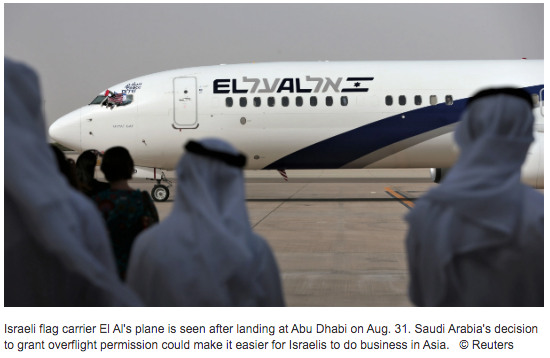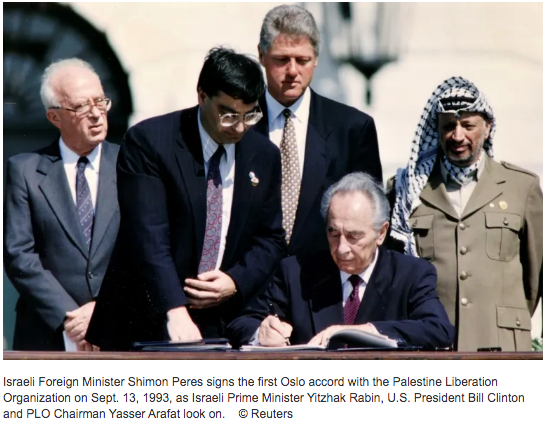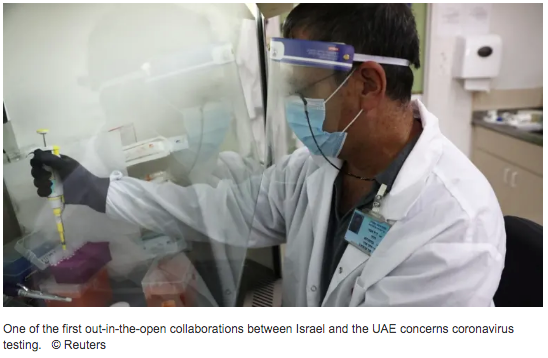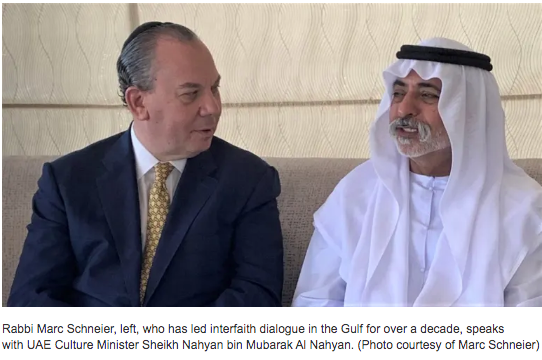
NIKKEI Asian Review
By: NESREEN BAKHEIT and JAMES HAND-CUKIERMAN, Nikkei staff writers
September 10, 2020
Investors abuzz over tech, trade and travel as China watches closely

DUBAI/TOKYO — On Sept. 13, 1993, Israeli and Palestinian leaders shook hands on the White House lawn to seal the Oslo Accords. The late Israeli statesman Shimon Peres, one of the architects of the arrangement, trumpeted the coming of a “new Middle East” that would bring peace and prosperity.
Twenty-seven years and several bloody conflicts later, most consider the Oslo process a failure. But now the stage is set for another signing ceremony in Washington on Tuesday — this time between Israel and the United Arab Emirates — that is generating similar optimism as a transformative moment for the region.
The trade, travel and investment opportunities this unlocks could extend not only across the Middle East but to Asia as well.
“I believe the economic, geographic and political fit between Israel and the UAE is close to perfect,” Eldad Tamir, a prominent investor in Tel Aviv, told the Nikkei Asian Review.
“Israel is poor in natural resources and rich in high-tech and biotech, but innovation means investing more money in R&D all the time, and the Israeli tech centers need new investors to keep developing,” he continued. “The UAE wants to enhance its economy beyond oil, diversify its exports and advance into the digital age. Therefore, the combination is powerful.”
Despite having never fought a war, the two governments are about to conclude a formal peace treaty dubbed the “Abraham Accord,” brokered by the Donald Trump administration. There had been rumors of a White House ceremony coinciding with the Oslo anniversary this Sunday, but the signing has been scheduled a couple of days later.
This will make the UAE only the third Arab country to formally recognize Israel since its establishment in 1948, after Egypt in 1979 and Jordan in 1994. While those relationships are often described as “cold peace,” the UAE agreement has already brought conspicuous displays of warmth and rumblings that other Muslim-majority neighbors may soon forge their own official ties with predominantly Jewish Israel.

On Aug. 31, Israeli airline El Al flew the first direct commercial flight between Tel Aviv and Abu Dhabi, carrying a delegation that included Trump’s son-in-law and adviser, Jared Kushner. In another first, Saudi Arabia opened its airspace to the Israeli plane — and reportedly agreed to allow all such flights.
This alone could have a major impact on Israel’s connections with the world, including Asia, according to Edouard Cukierman, the head of one of the country’s largest investment firms.
“One of the challenges for Israeli companies to fly to Asia is they cannot fly over Saudi Arabia and all the [Gulf] countries,” said Cukierman, who was headed to the UAE by way of Paris when Nikkei caught up with him. Now, he said, Israelis will be able to take more direct routes, reaching Asia faster.
Likewise, if UAE aviation “super connectors” Etihad and Emirates fly to Tel Aviv, it will make traveling there easier for Asian businesspeople who have had to transfer in Europe or Turkey.
“That’s a big advantage,” Cukierman said.
He sees potential for cooperation and investment to snowball.
“Singapore became a strong base for Israeli companies to develop activities all over Asia,” he said, suggesting the Emirates will benefit as a similar jumping-off point. In addition, new partnerships in the UAE could help Israeli businesses access other Asian countries.
“We are very active in China but we are not active in India,” Cukierman said. “One of the partners we’re in discussions with, they want not only to help Israeli companies to deploy their activities in the Gulf countries but also in India.”
Excitement over shared innovation is palpable. One of the first fruits of normalization was an agreement to collaborate on rapid coronavirus testing equipment. Israel also boasts solutions that meet many UAE needs — from water treatment and desert agriculture to cybersecurity.

Guy Holtzman, who follows Israel’s startup scene as CEO of the IVC Research Center, sees benefits from two angles.
“First, both countries invest in R&D and innovation,” he said. “With more than 9,000 active startup technological companies, thousands of investors and tens of thousands of experienced managers, the Israeli tech ecosystem is highly enthusiastic about the new collaboration opportunities with UAE partners.”
Secondly, he noted that while American, European and Chinese investors poured money into Israeli tech over the years, almost no funding came from Arab sources. “The agreement with the UAE can change this trend,” creating “lucrative” opportunities for shareholders.
Not everyone shares the enthusiasm.
Public sentiment within the UAE is difficult to assess. Although some Emiratis took to social media to express their joy and reach out to Israelis, three UAE investment banks contacted by Nikkei declined to comment on the “highly sensitive” matter. Of course, the UAE only just abolished an Israel boycott law that had been on the books since 1972.
Tamir, the investor, said there “could be” some reluctance to work with Israeli companies but predicted this would “subside.”
“I can tell you the way I’m hosted, the way people at the very senior level are hosting us, is amazing,” said Cukierman, adding it took him years to achieve similar access in China.
Meanwhile, although the accord halted Israeli Prime Minister Benjamin Netanyahu’s planned annexation of West Bank territory, Palestinian leaders are furious with the UAE for not demanding Israel reach an accommodation with them first. They pulled out of next month’s Dubai Expo in protest.

Other international reactions have been mixed. Turkey and Iran — key targets of increased Israeli security cooperation with Gulf countries — predictably slammed the rapprochement. Responses from two Asian nations that still refuse official relations with Israel, Indonesia and Malaysia, have been muted.
Malaysian Foreign Minister Hishammuddin Hussein issued a statement saying the UAE was exercising its “sovereign right” but demanding an independent Palestinian state.
Then there is China, which has brought both the UAE and Israel into its Belt and Road infrastructure initiative but is also drawing closer to their nemesis Iran. Foreign Ministry representative Zhao Lijian last month welcomed the deal, saying Beijing supports “measures that will help alleviate tension” in the Middle East.
At a time when almost everything Trump does is seen through the lens of the U.S.-China conflict, some observers have suggested Washington played matchmaker to weaken Beijing’s influence. Cukierman was not convinced.
“Israel is part of the Silk Road, and if we are enabling the Chinese to go to Israel thanks to the support of the neighboring countries, that’s a big game changer for us and for developing the Chinese relationship,” Cukierman said. “I don’t see how it is negatively impacting our relationship with China. It’s the opposite.”
Shu Meng, a research fellow specializing in the Middle East at Shanghai International Studies University, suggested much depends on the nature of the budding ties.
“For China, the advancement of the Belt and Road Initiative needs to be based on a peaceful and stable geographic environment,” she said. If Israel and the UAE push for regional peace, it is “beneficial” to China.
“However,” she warned, “if the peace agreement between Israel and the UAE is intended to jointly oppose Iran, it may trigger the formation of a regional ‘cold war’ confrontation in the Middle East, which is detrimental” to stability.
The reality may be a bit of both.

“The deal has worked because both the UAE and Israel have unified goals, including a fight against coronavirus, a fight against Iran and securing Middle East peace,” said Rabbi Marc Schneier, who has promoted interfaith dialogue in the Gulf for 12 years.
Behind it all, he sees a strong undercurrent of deepening religious understanding.
“Arab leaders will not take a decision unless the chief religious scholar approves. … Once they are on board, then the Arab leaders are too,” he said, noting that prominent figures in the Gulf “are aware of the close similarities” between Islam and Judaism.
Schneier expects the Abraham Accord is only the beginning, and predicted Bahrain will be the next to formalize relations with Israel this year. That, indeed, could be another step toward a new Middle East.
Copyright © 2025 Foundation For Ethnic Understanding. All rights reserved. | Privacy Policy